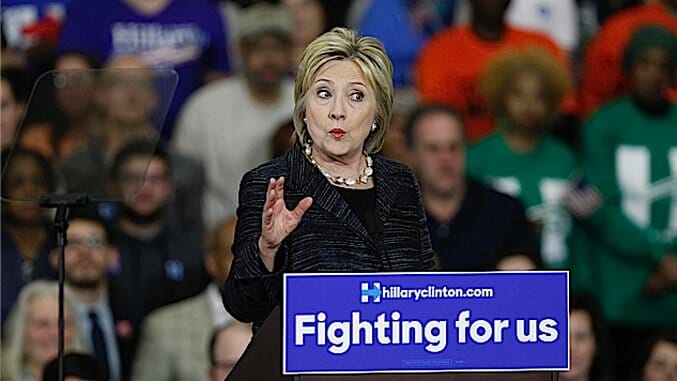Thank Your Favorite God for Bernie’s Michigan Win, Because A Clinton Nomination Would Split the Democratic Party
Photo by J.D. Pooley/Getty
After Hillary Clinton’s southern dominance, as well as her narrow wins in Iowa and Massachusetts, Bernie Sanders’ Michigan win could be a turning point. For weeks the Wolverine State appeared to be a safe bet for Clinton—even FiveThirtyEight gave her a greater than 99 percent chance of winning. However, as voters became more familiar with Sanders, the dynamic changed. This latest victory is a welcome narrative shift for the underdog Vermont Senator which promises to carry him to future victories in the North and states that Democrats can win in a general election.
Sanders’ win is a good thing for Democrats because he is the only candidate who can unite the party in November. There is no way economic progressives and Bernie supporters will accept a Hillary Clinton nomination after everything they’ve seen in this primary.
The other night Vermont superdelegate Howard Dean tweeted the following:
@D_Born@BernieSanders Super delegates don’t “represent people” I’m not elected by anyone. I’ll do what I think is right for the country
— Howard Dean (@GovHowardDean) March 5, 2016
In Dean’s state, Hillary Clinton won less than 14 percent of the popular vote. To Bernie Sanders supporters, Dean’s promise to vote Clinton in spite of the overwhelming voice of the people of Vermont is just the latest example of the primary being rigged against them. To progressives, it is further evidence of the “coronation” which has dissuaded many from voting (voter participation is down nearly 30 percent from 2008).
The feeling that Bernie Sanders has not been given a fair shake has given rise to the “Bernie Or Bust” movement—voters who will turn their backs on Hillary Clinton in November if she wins the nomination. These voters now represent roughly 14 percent of the Democratic base, and are a growing concern for party leaders who fear that the division will lead to a President Trump or a President Cruz. This fear has caused much hand wringing and outrage from Clinton supporters directed at the Bernie Camp.
However, if this scenario does happen, and Trump or Cruz wins the election due to low Democratic turnout, the blame will lie squarely with Hillary Clinton, the DNC, and the media for alienating Bernie supporters.
Hillary Clinton
In spite of her record, her donor list and the fact that most of her campaign funding (83 percent) comes from large donors—all of which progressives find troubling—Hillary Clinton could have stemmed the spread of “Bernie Or Bust.” Instead she has conducted her campaign in such a way that, now, most voters feel she is dishonest.
A recent article from the New York Times revealed that Clinton’s strategy to defeat Trump boils down to fear. She hopes to scare enough of the economic progressive wing of the Democratic Party (Bernie’s camp) into voting for her while she appeals to social moderates on the right. This is why Clinton flip-flops on progressive rhetoric even in the internet age where voters can easily see her playing both sides on Youtube.
-

-

-

-

-

-

-

-

-

-

-

-

-

-

-

-

-

-

-

-

-

-

-

-

-

-

-

-

-

-

-

-

-

-

-

-

-

-

-

-








































